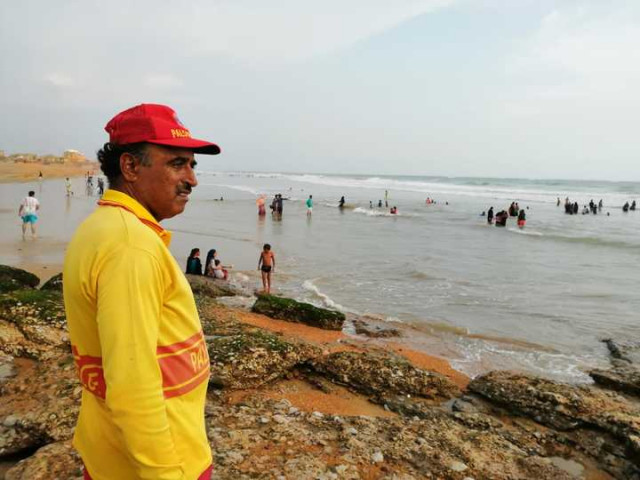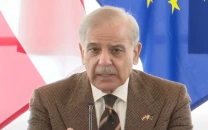Quintessential Karachi: Warring with the sea, saving lives each day
Muhammad Anwar, a fisherman has devoted his life to protecting the life of citizens at the beach

Muhammad Anwar. PHOTO: EXPRESS
One such individual is Muhammad Anwar, born into a family of fishermen, resident of Haji Abdur Rehman Goth, near Hawkes Bay, who is trained in professional lifeguard skills. Anwar, whose three brothers and father are also trained lifeguards, believes that fishermen have a duty to guard and protect people from the sea. “Children born in fishermen families are swimmers by birth. They understand the nature of the sea,” says Anwar. “Rescuing people from the sea is our obligation. It is a responsibility given to us by the Almighty, we believe, and we dispense this duty with gratitude.”
Drawn to the sea
For Anwar, the sea is where he is meant to be. Speaking to The Express Tribune, Anwar says that he spent his youth rescuing people from drowning in the sea. It wasn’t until 2004, however, that Anwar became a certified lifeguard. By then, he had worked at Karachi Nuclear Power Plant (KANUPP) as a technician for seven years and prior to that, he completed his intermediate education in the Faculty of Science (FSC) from Haji Abdullah College in Lyari and a diploma in computers in 1992. Despite having the option to pursue an alternative career, he opted to join his family profession once his contract with KANUPP ended.
As a fisherman, Anwar spent his days catching fish and his life around the sea. When he wasn’t earning his livelihood, he stood guard at sea with an eye out for any unsuspecting visitor at the beach whom the waves had carried off.
In 2004, he joined the Pakistan Life Saving Foundation (PALS) - a not-for-profit organisation funded through private and public grants which provides beach rescue and water safety services. He was trained during a 15-day workshop along with around 500 others. They were given technical expertise, taught how to give first aid, conduct rescue breathing and cardiopulmonary resuscitation (CPR). They were also taught how to ensure personal safety and take protective measures for citizens frequenting the beach.
Not long after, Anwar was given the charge of supervising rescue operations and imparting training to others signing up for the job.
PALS has 25 lifeguards as its permanent employees and over a 100 temporary lifeguards who work day and night to ensure the safety of those visiting the beach. On an average day, there are two lifeguards deployed at each of Karachi’s 12 coastal zones - with the exception of two, while on weekends or public holidays when a larger number of picnickers are expected at the beaches, the temporary life guards are called in. The lifeguards, who comprise mainly of coastal area residents, consider it their life’s mission to warn the public of dangers at sea and rescue them from any life-threatening situation at the beach.
There are 10 lifeguards and one supervisor responsible for each zone and Anwar is in-charge of them all. The lifeguard's report for duty at 10 am and their supervisors remain in contact with other PALS officials through wireless devices. The lifeguards and their supervisors strategise each day as to how their rescue efforts would be carried out and if warnings to citizens need to be updated depending on the weather and the tide that day. Anwar says that prior to PALS, there were at least 300 deaths by drowning at sea annually but now the numbers have reduced significantly. He regrets, however, that there are no PALS lifeguards deployed at Gaddani and Kund Malir due to lack of resources.
What it takes
An exceptional swimmer may fare better than most at sea but that would hardly qualify him as a certified lifeguard, says Anwar. One has to be cognisant of the fact that the further you get from the seashore, the higher are the waves and the stronger the current. The waves can trap a swimmer within their current forming a swirl and pulling them in deeper and deeper. A lifeguard, however, is equipped with the skill of manipulating the current to his advantage and is able then to rescue a drowning person. As it is always a battle with nature, success isn’t always guaranteed. But, according to Anwar, his training has prepared him for most difficult situations and nearly 5,000 people so far have been saved under his supervision.
A significant portion of the job requires constant vigilance. The lifeguards keep their eye on the shore at all times and give warning signals if they fear anyone is heading out too far.
Lifeguards are also trained in quick decision making. They are also supposed to assess the risk levels of any rescue operation and determine whether it would be possible to save the person being taken by the sea. He is permitted to endanger his own life only to a certain extent. Beyond that, according to Anwar, it is wiser to accept defeat as hundreds of other lives could be saved if the lifeguard lives to serve another day. It is a precarious situation and one that requires quick thinking as each human life is precious, says Anwar. Physical and mental fitness is, of course, another requirement of the job.
Filling in the gaps
PALS was founded by Reza Samad, a citizen who would frequent the beach and often hear from those residing along the coast of picnickers drowning. Ad hoc rescue efforts were not always successful and without a proper mechanism in place the death toll was high.
In 2001, Anwar had the option of working as a lifeguard as a district government employee but for that, he would have had to work for two years without pay. While at PALS he had to fulfill a similar condition, he preferred to work for them instead. The permanent employees at PALS are paid Rs15,000 a month and are also given education and training during their employment, says Anwar. Explaining his decision of working for the not-for-profit organisation he says, “the organisation of the foundation is such that it operates solely for saving human lives.”
He points towards the void left by governmental organisations when it comes to ensuring the safety of citizens at sea that he believes PALS has filled. According to him, 10 watchtowers were built for lifeguards by the Pakistan Navy in 2009 but nine out of 10 of them are now in a dilapidated condition. They have crumbled over the years due to atmospheric conditions and the rise in sea level. Such watchtowers need to be repaired and a larger number of them is needed, according to Anwar, to ensure safety at beaches. In light of limited facilities, he stresses upon the need for citizens to take their own precautionary measures, pay heed to warnings and never underestimate the sea.
“The lack of funds means services [of PALS] are often constrained,” notes Anwar. The foundation trains around a 100 lifeguards each year and if enough funds are available, Gaddani and Kund Malir coasts could also be secured, says Anwar.
This story is part of a weekly series that seeks to bring to light the unsung heroes of Karachi - the hawkers, traders, doctors, teachers, engineers, lawyers, and daily-wage labourers. It is they who make Karachi the city of lights.
Published in The Express Tribune, September 9th, 2019.


















COMMENTS
Comments are moderated and generally will be posted if they are on-topic and not abusive.
For more information, please see our Comments FAQ